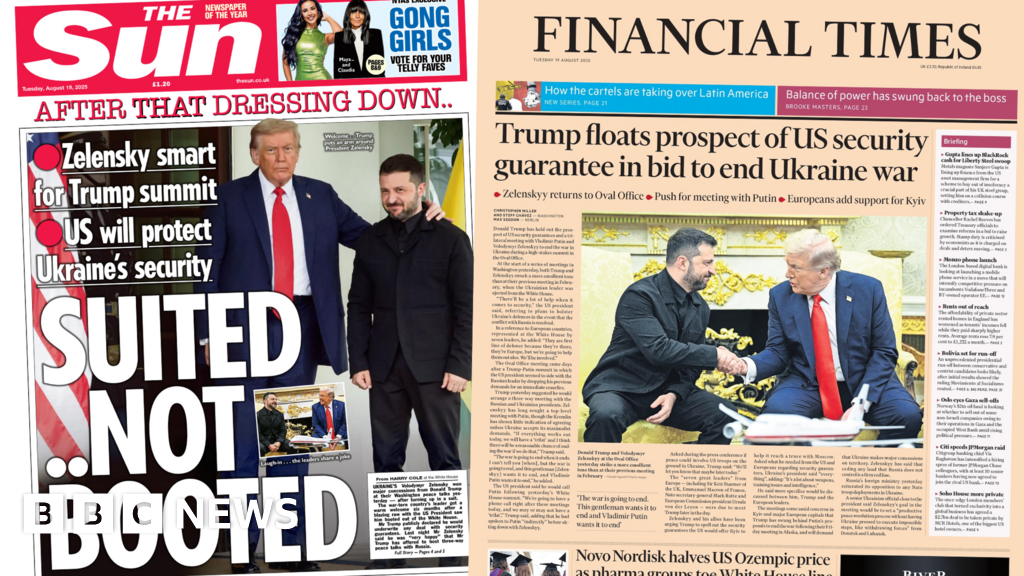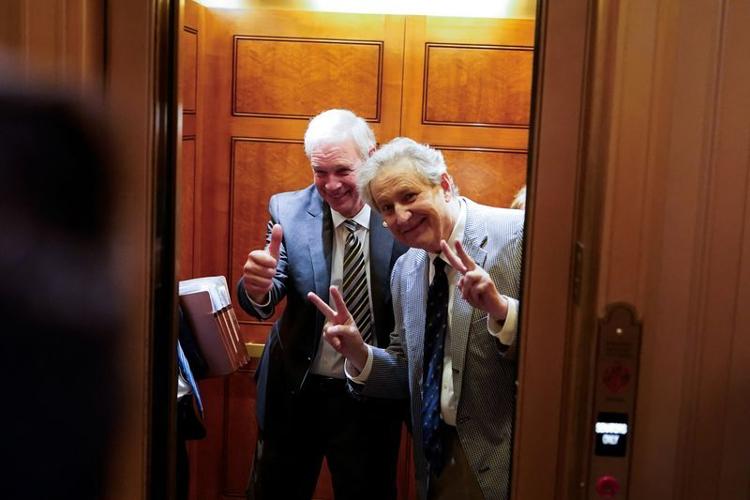Legal Battle Between Fed Governor and President Trump Continues

Introduction
The legal battle between Fed governor Lisa Cook and President Trump continues to make headlines as they await a ruling on the case. Cook, who was nominated by President Biden, has accused Trump of trying to sabotage her nomination. Both parties have filed their arguments and are now waiting for a decision from the court.
Key Details
Cook's allegation is based on a tweet from Trump in which he claimed that Cook's nomination was "disastrous." Cook's lawyers argue that this tweet is evidence of Trump's intent to undermine her nomination. On the other hand, Trump's lawyers argue that the tweet was simply expressing an opinion and was not meant to interfere with Cook's nomination process.
More filings are expected in the coming weeks as both parties continue to present their arguments. This includes potential witness testimonies and evidence to support their claims. The court will have to carefully consider all the details before reaching a decision.
Impact
The outcome of this legal battle could have far-reaching implications for future nominations, as well as the relationship between the Fed and the White House. It also highlights the ongoing political tensions and conflicts between the current and former administrations.
As the case unfolds, many are closely watching to see how it will be resolved and what long-term effects it may have on the financial and political landscape. It is a reminder that even
About the People Mentioned
Lisa Cook
Lisa DeNell Cook (born 1964) is an American economist and a member of the Federal Reserve Board of Governors, having assumed office in May 2022 and reappointed in September 2023 for a term ending in 2038. She is notable as the first African American woman to serve on the Federal Reserve Board[1][2][6][8]. Cook holds a BA in Physics and Philosophy from Spelman College, where she was the first Marshall Scholar, and earned a second BA in Philosophy, Politics, and Economics from Oxford University. She completed her Ph.D. in Economics at the University of California, Berkeley, specializing in macroeconomics and international economics[2][3][6]. Her academic career includes faculty positions at Harvard University's Kennedy School of Government (1997–2002), where she was deputy director of Africa Research at the Center for International Development, and Michigan State University, where she has been a professor of economics and international relations since 2005 and gained tenure in 2013[1][2][3][6]. She was also a National Fellow at Stanford University's Hoover Institution (2002–2005). Cook has held significant advisory roles, including senior economist on the Obama Administration’s Council of Economic Advisers (2011–2012) and senior advisor on finance and development at the U.S. Treasury Department (2000–2001). She advised the Nigerian government on banking reforms and Rwanda on economic development[1][2][6]. Her research spans international economics, economic growth, innovation, financial markets, and the economic history of African Americans, notably linking racial violence during Jim Crow to suppressed patent activity. She also leads efforts to promote diversity in economics, directing the American Economic Association’s Summer Program for underrepresented minority students and serving on its Executive Committee[1][5][6]. In 2020, Cook contributed to the Biden presidential transition team’s review of financial regulatory agencies. She has also served on the board of directors of the Federal Reserve Bank of Chicago and the Federal Home Loan Bank of Indianapolis[1][5]. Cook is recognized for her scholarship, public service, and advocacy for inclusion in economics, and has been honored as a leading Black economist by Fortune magazine[5].
Donald Trump
Donald John Trump, born June 14, 1946, in Queens, New York, is an American businessman, media personality, and politician. He graduated from the University of Pennsylvania’s Wharton School in 1968 with a degree in economics. In 1971, he took over his family’s real estate business, renaming it the Trump Organization, through which he expanded into building and managing skyscrapers, hotels, casinos, and golf courses. Trump gained widespread fame as the host of the reality TV show *The Apprentice* from 2004 to 2015, which helped establish his public persona as a successful entrepreneur. Trump entered politics as a Republican and was elected the 45th president of the United States, serving from 2017 to 2021. His presidency was marked by significant policy actions including tax cuts, deregulation, the appointment of three Supreme Court justices, renegotiation of trade agreements (notably replacing NAFTA with the USMCA), and a focus on immigration control including border wall expansion. He withdrew the U.S. from international agreements such as the Paris Climate Accord and the Iran nuclear deal, and engaged in a trade war with China. His administration’s response to the COVID-19 pandemic was criticized for downplaying the virus’s severity. Trump was impeached twice by the House of Representatives—first in 2019 for abuse of power and obstruction, and again in 2021 for incitement of insurrection—but was acquitted by the Senate both times. After losing the 2020 election to Joe Biden, Trump challenged the results, culminating in the January 6, 2021, Capitol riot. He remains a central figure in American politics, having won the 2024 presidential election and returned as the 47th president in 2025, continuing to promote policies aimed at economic growth, border security, and military strength[1][2][3][4].
About the Organizations Mentioned
Fed
The **Federal Reserve System (Fed)** is the central bank of the United States, created by Congress in 1913 to provide a safer, more flexible, and stable monetary and financial system[1][2]. It consists of a Board of Governors in Washington, D.C., and 12 regional Reserve Banks located across the country, each serving distinct districts, collectively overseeing national monetary policy, financial supervision, and payment services[1]. The Fed’s core responsibilities include **conducting monetary policy**, **regulating and supervising banks**, and **maintaining an effective payments system**[1][3]. Its most visible function is managing monetary policy to influence money supply and credit with the goals of **price stability** and **maximum sustainable employment**, a dual mandate established by legislation in the 1970s[3]. To achieve this, the Federal Open Market Committee (FOMC) targets the federal funds rate, guiding interest rates and liquidity through tools like open market operations and reserve requirements[3]. Historically, the Fed was established after two previous central banks failed in the 19th century, responding to early 20th-century financial turbulence with a hybrid federal-regional system designed to balance centralized control and local insight[2]. The Federal Reserve’s decentralized structure allows it to closely monitor economic conditions nationwide and respond to regional challenges[2]. Key achievements include successfully navigating multiple financial crises by ensuring liquidity and financial stability, and continuously evolving its monetary policy framework. The Fed conducts a comprehensive review of its monetary strategy every five years, with the latest in 2025 incorporating public feedback and academic research to refine its approach to stabilizing the economy[4][7][9]. The 2025 update reaffirmed commitment to its dual mandate, emphasizing transparency and adaptability[5]. Currently, the Fed is managing the transition from pandemic-era monetary expansions by shrinking its balance sheet to maintain adequate liquidity while continuing to influence interest rates effectively within an ample reserves framework[6]. Its independence and nonpartisa
White House
The **White House Office** is a central organizational component within the Executive Office of the President of the United States (EOP), tasked with supporting the President in managing day-to-day operations, policy formulation, and political affairs. It is headed by the White House Chief of Staff and staffed by senior aides who report directly to the President, including those with titles such as Assistant to the President and Deputy Assistant to the President. These staff members are mostly political appointees without the need for Senate confirmation, allowing the President considerable discretion in shaping the office to suit each administration's priorities[1]. Historically, the White House Office was established in 1939 through Reorganization Plan 1 and Executive Order 8248 to provide immediate assistance to the President. It functions as the nerve center for presidential staff, physically located primarily in the West Wing, and plays a pivotal role in managing the President’s policy agenda, communications, and political strategy. Its flexible organization allows each President to tailor the staff composition and roles according to their governance style and objectives[1]. In the current context of 2025, the White House Office operates under the administration of President Donald J. Trump, who returned to office after the 2024 election. His administration emphasizes rejecting prior policies deemed extremist and focuses on enhancing quality of life, economic growth, and American energy dominance. The administration includes Vice President JD Vance and First Lady Melania Trump, among others, with a Cabinet advising on various governmental functions[4][6]. Recent initiatives linked to the White House’s operational sphere include the establishment of a new **Department of Government Efficiency (DOGE)** aimed at modernizing federal technology and software to boost government productivity. The DOGE agenda is implemented through the renamed United States DOGE Service within the Executive Office, reflecting a concerted push to leverage technology for administrative modernization[5]. Notably, the White House Office also coordinates national security and homeland security functions through the National Security Council staff, underscoring its central role

















